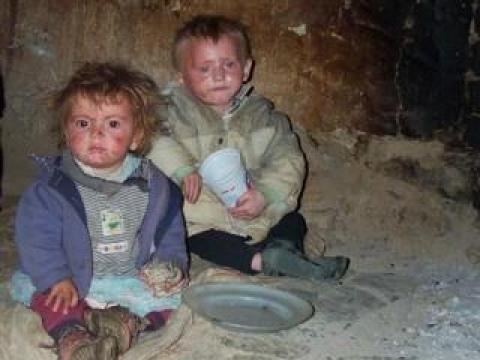Poverty in Albania: Imagine the world in which Olsi (6) was born….

“Olsi has a developed mind,” affirms Dr. Marietta of the Elbasan Pediatric Hospital. “I watch his reactions to the people around him. I call him ‘my baby’ because I have looked after him for two-thirds of his life. His family is unable to care for him properly as they are very poor and uneducated. If Olsi had received physiotherapy and good food from the beginning of his life, he would be running around with his siblings by now.”
Olsi is physically handicapped, but much of his low development is due to atrophy from a lack of exercise and stimulation. Last month he caught a cold, which became life-threatening due to his fragile state. World Vision rushed him to the hospital where he was put on a drip, then purchased diapers and baby food for him. Hospitals in Albania are not able to provide these and the family is too impoverished.
The house where Olsi lives with his parents and five siblings is more a shack than a home. Olsi mothers apologizes: “I am really scared that one night my house will collopse on my children while they are asleep”. Just 12x12 feet, it is made of rough stone and without windows. For cooking there is just a stick fire on the dirt floor. The same floor on which Olsi and his 3 brothers and sisters were born, without any help of a nurse. A handmade bed frame with a mattress of straw sits in one corner and that is the extent of the ‘furniture’. Olsi and his siblings sleep on the bed while the parents sleep directly on the floor. The winter-time snows sift through the stone walls, leaving the inside temperature below freezing.
Outside there is evidence of a small garden. The soil has been prepared, but nothing grows as Olsi’s parents couldn’t afford the seed.
Albania continues to have a weak economy, characterized by fragile internal and external economic factors. Per capita income is the lowest in Europe, and ranks among those of many developing world states in Asia and Africa. Poverty and unemployment figures are dismal, and economic inequality has been steadily growing. Rural areas are most impacted by poverty, especially the more remote regions of the country. Education indicators have worsened over the last decade, including literacy rates and enrollment in primary and secondary education. Health care has deteriorated, especially in rural areas of the country. Infant and maternal mortality rates and disease incidence are unacceptably high.
Poverty in Albania is a ‘multidimensional phenomenon’ that is characterized by: 1) low or very low level of income, 2) higher incidence of disease and lack of appropriate medical services, 3) illiteracy or low level of schooling, 4) high level of risk exposure, and 5) low voice in government decision-making institutions. According to official statistics, 29.6% of Albanians are poor, while half of them live in the category of extreme poverty, living on less than US$1 per capita per day. One in three families have low quality housing. There are serious problems with potable water supply, sewage and roads. Infant and under-five mortality rates are among the highest in the region, with almost one in seven children under five being malnourished. Illiteracy and school drop-outs have increased. In addition to lack of income, 75% of poor families experience acute social problems.
This is the world into which Olsi has been born. This is the world of which Olsi’s mother says: “ I hope my children are able to emigrate, as for Albinia there is no hope”. To provide Olsi with proper medical care, there is a long process fraught with bureaucracy. After a physician’s diagnosis, a ‘commission’ from the Department of Health must decide if Olsi qualifies for treatment by a physiotherapist.
In addition to medical assistance for the care of Olsi, World Vision is providing the family vegetable seedlings to plant in their garden. The World Vision Agriculture Officer will make regular visits to advise and encourage their garden production. World Vision also supplied mattresses and blankets for the family.
World Vision has started a Health Education Program to assist families like Olsi’s. The need is great and no one else is there to help. This is a project that will be beneficial to the poorest of the poor.
Photo: Judy Moore
Olsi (right) is six years old and weighs just nine kilos. He sits on the dirt floor of their home with this two-and-a-half year old sister.
They sit all day next to a smoky fire in their one room house that has no windows.
See for recent follow up story: One of Albania\'s invisible children now enjoys fullness of life